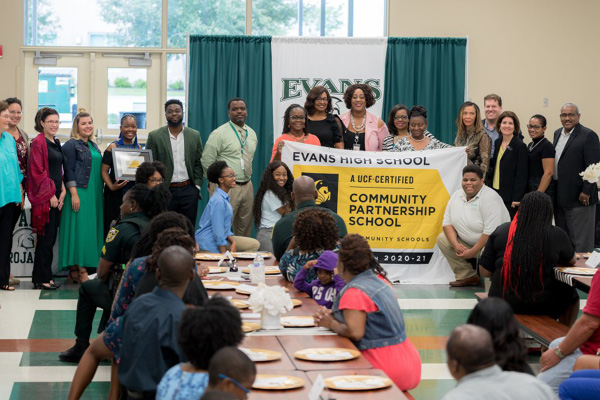Evans High School Becomes 1st UCF-Certified Community Partnership School
Reprint from UCF College of Community Innovation and Education UCF.edu
UCF has been helping to build a new model of community school for children in grades K-12 for nearly 10 years. As a result, there are 16 registered Community Partnership Schools in Florida. Of those 16, Evans High School in Orlando recently became the first to be a UCF-Certified Community Partnership School.
They're Number 1: Faculty and community partners celebrate Evans High School becoming the first UCF-Certified Community Partnership School.
The school recently celebrated this achievement at a community event at which a banner announcing its new status was unveiled.
“Being a UCF-Certified Community Partnership School sets us apart from all others,” says Rolondo Bailey, principal of Evans. “Not only have we been doing the work of empowering students and families, but now we have been rigorously assessed to validate the work.”
C. A. Weis Elementary School in Pensacola also was recently certified.
To ensure consistency of quality programming, strategy and framework fidelity, the UCF Center for Community Schools, along with partners across the state, developed a process of certification that reflects best practices in the field of community schools.
And according to David Bundy ’97, the importance of a certification process was discussed prior to the opening of Evans, the flagship Community Partnership School. Bundy is the president/CEO of the Children’s Home Society of America, and has been involved in the community school initiative since the beginning.
Before the initiative could be funded by the Florida Legislature, Bundy and others had to address concerns that there be quality control over what they had identified as the key elements of a community school model.
“We were proposing to replicate a model developed by the Children’s Aid Society of New York, which has almost 20 years of supporting research,” Bundy says. “The model included core partners, after-school programs, on-site health care, and parent and student engagement that were integral to the success of the model.”
Additionally, Bundy says, “The primary purpose of the certification is to ensure fidelity with a proven model and to protect the use of the Community Partnership School model as one that is consistent and includes a rigorous quality assurance process.”
UCF staff and community members met last year to determine if Evans High School - A Community Partnership School met the criteria to become certified. First row, front to back: Amy Ellis, director of the Center for Community Schools; Sarai Antoine, Student Leadership Council vice chair, Kea Cherfrere, Community Council chair and Evans alumna. Second row, front to back: Lakema Massey, Community Partnerships School director, Sulphur Springs YMCA, Jarrad Plante, programs coordinator for the Center for Community Partnerships, and Pastor Frank Thompson.
UCF provides ongoing technical assistance and training for schools becoming a Community Partnership School, says Amy Ellis, director of the Center for Community Schools. The model requires signed, multi-year commitments from a school district, health care provider, university or college, and a lead nonprofit partner. These partners work together with the school’s leadership, as well as community and student leadership councils.
“All of our partners are deeply committed to our children and their families,” Ellis says. “Why? So they, too, can support families and lift students to new heights of success.” Evans’ other partners include Orange County Public Schools, Children’s Home Society of Florida, and Orange Blossom Family Health.
Since Evans became a Community Partnership School, student test scores and other metrics have significantly increased, Ellis says. Especially notable: Evans’ graduation rate has improved from 64 percent in the 2010-2011 school year (when CPS efforts began) to 87 percent in the 2016-2017 school year. Prior to becoming a Community Partnership School, Evans was labeled a “dropout factory” by Johns Hopkins University.
“There are other ‘community schools’ throughout the nation, but few if any have all the components and commitment of the Community Partnership School model,” Ellis says. “Achieving status as a UCF-Certified Community Partnership School sets Evans apart from other schools, and represents years of intentional, dedicated work to building partnership and aligning resources to ensure student success and well-being.”
Written by Camille Dolan, ’98
Select News Category
Counselor Education, Community Partnership Schools, Criminal Justice, Health Management and Informatics, Higher Education, International Community Schools, Legal Studies, National Community Schools, Public Administration, Public Affairs, Teacher Education


